Parting the white sea
Día 63-64: Mystery eggs, mystical islands and a man with spicy lips (125km)
Part of Chapter 8 The Bolivian Diary
Día 63 (GPX) Salar de Uyuni to Isla Pescado, 60km
From that spellbinding, glittering home we set out west. It’s always a great feeling to pack everything you own into a few small bags and leave nothing behind. Today that experience is amplified because there’s not a speck of flattened earth or cowed grass that betrays our presence.
I litter pick in the morning session, disgruntled by the capacity for tourists to denigrate this pristine land with empty Corona bottles and crumpled Oreo wrappers. It’s a game of Tetris wedging piece after piece of discarded material onto my bike. Each removal returns a small section of this place to its natural state. By the time we reach the first island, I have recovered 26 items. As custodians of these magical spaces our carelessness seems to know no bounds.
‘In the heart of the Salar de Uyuni salt flats lies Isla Incahuasi, one of the main attractions for most visitors. The name, which means ‘House of the Inca’ in the native language of Quechua, highlights the importance of the island to the Incans. Years ago, before the invention of jeeps, local people would use Isla Incahuasi as a temporary refuge when crossing the salt flat. The island is the remains of an ancient volcano which was submerged when the area was part of a giant prehistoric lake, roughly 40,000 years ago.’1
Nothing emphasises the bizarre nature of Bolivian geography like cycling out of the sea and onto an island. Three gaudy yellow portaloos stared out from beneath a forest of cacti that littered the rocky outcrop. We leant our bikes on stone tables offshore and, deciding bike theft was unlikely, left them unguarded as we crunched through the salt towards a dirt path. It led to a tiny kitchen that would provide sustenance to take the pressure off our limited supplies.
An aging couple ran the hole-in-the-wall outlet, their skin was taught and bronzed from a powerful sun. We later learned they had lived on the island selling simple food to travellers for decades. A few bare shelves were home to biscuits and sweets wrapped in garishly coloured plastic. The dusty benches arranged around tables were draped in matted llama coats. Their powdery coating underlined the months without rain that had gone before.
At first, the two ancianos (older people) were reluctant to cook us a vegetarian meal. I tried again, but this time explained that we were travelling by bicycle and that we didn’t have many supplies. Our slow travel method often gave us an air of vulnerability that compelled strangers to take pity on us. After all, we were hours of leg work from another shop.
“We’ll eat anything simple; do you have eggs and bread by any chance?” The smell of a frying egg wafted through from the kitchen.
“No temenos nada de pan, ni un huevo”
“No, we don’t have any bread and not a single egg.”
She shifts from foot to foot. I’m convinced I can hear an albumen sizzling behind a thin partitioned wall. She runs her fingers along her jaw thoughtfully,
“But what could I make for you…do you eat rice?” she ponders.
“We’ll eat anything apart from meat.” I nod enthusiastically, “Rice and vegetables sound great, thank you”.
A few moments passed and then out came a pile of white grains, thin slices of tomato and cucumber and, would you believe it, quietly nestled in the corner of each plate, a fried egg. I think they warmed to us as cyclists and decided to take pity on us, for it was followed by a logbook for cycle tourers. Jake duly obliged, scrawling English alongside French, Dutch and Spanish to add our tale to those who had travelled here in years past (including Maud!).
We slurped down a bitter instant coffee and a few out-of-date biscuits to go with the bonus hot meal. You can’t say no to food in situations like these. You never know what the next 50km will bring in the way of sustenance but in this case it’s fairly obvious; sweet fuck all.
When we pay, el viejo (the old man) is so bad at totting up our bill – a weakness he seems fully conscious of – that he falls into hopeless giggles. His wife eventually loses patience with him, returns, and does the addition on her fingers with marginally more success. In Bolivia there wasn’t a card machine in sight anywhere outside of the major cities. It was a common habit of shopkeepers to spend a few moments counting aloud or scribbling down prices whenever we came to the counter. It was a pleasing reminder of how paying for things without technology worked just fine, and how, at least in this man’s case, it used to be quite funny; particularly if you were rubbish at maths.
After lunch, we paced along the short hiking trail to the tip of the island and dropped inside the fossilised coral formations that reduced our lives to a nanosecond in the long story of existence. We watched a trickle of jeeps appear on the horizon, speed towards the islands and unload brilliantly coloured cloths onto the stone tables. After eating they would streak away, shrinking to a black speck before they were taken by the curvature of the earth.
As the afternoon sun waned, we pushed on to the next island, Isla Pescado, some 17km to the west. This island was larger than Incahuasi, but deserted. After setting up tents on the shore and wiggling on all our layers, we packed the gas cannister, spicy noodles, and a couple of beer cans we’d bought from Colchani into a canvas bag. Then we picked our way up to the ridgeline to watch the sunset. There was a conspicuous absence of sound bar the distant engine of the last tourist trucks hot footing it off the flats for the night. As the sky turned crimson, magenta and a fiery orange, the spacey, low-energy dream-pop of The XX soothed our limbs. Jake’s reverie was interrupted by a trip to the pain cave with those tangy noodles that earned him the nickname of “Spicy Lips” Hudson. Sadly, there wasn’t another soul for miles around that could laugh along with me at his minor misfortune.
Día 64 (GPX) Isla Pescado to Llica, 65km
“LLLLLLLLIIIICAAAA” [YYYiiiiii-KAAA]
is the call the next day as we set a course for the last time through Uyuni towards a village of the same name (well, not exactly the same name, ‘Llica’ was the official title, but adding a load more letters and screaming it to the wind seemed like the best way to announce our imminent arrival). The town had become an essential resupply point after our food had rapidly and irreparably run out with a final packet of half-frozen Pinguinos.
The roads leading up to Llica were, as expected, appalling fare. To help you picture it, I’d recommend the following strategy:
Imagine a crushed gravel path. Take a sledgehammer and smash it repeatedly at random intervals. Secondly, use a JCB digger to remove great chunks of the surface without any particular accuracy or good intention. Next, dump great quantities of sand irregularly across the surface. Then sit back, relax, and wait for an 8.6 magnitude earthquake to destabilise what remains. Finally, be sure to run a few articulated lorries back and forth over the mashed track. And there you have it, the average Bolivian rural road surface.
In Llica we wait an hour for a chicken shop to open so we can disappoint them by only ordering chips and rice. A bright-eyed old man marvels at how English has become the lingua franca of the world and then criticises a rude Israeli tourist he once guided who put her feet on the window and turned up the music so loud that he couldn’t talk to the rest of the group. An old lady knits whilst transfixed by an episode of WWE Friday Smackdown that blares out from her antiquated TV set. This is a common occurrence in Bolivia where female wrestlers (known as Cholitas) dress in long skirts and plaits and take to the ring to body slam their opponents into submission. More on that when we reach the capital, La Paz.
It's another 80km or 1.2 days ride to the next town so we push out of Llica in the late afternoon. The road was appalling. At this point it wasn’t clear which sandy path was the correct sandy path but we didn’t have the energy to care. We promptly jacked in any ideas of progress, wrenching the bikes through deep silt towards a clearing of low, gorse-like bushes. The baby wipes were a god send that night as the muck came off in great swipes of moist cotton down our filthy arms. That’s three days without a shower but nowhere near the record yet.
After a warm day I’m optimistic about the cold and go to bed with less layers. I only have my self to blame when I awake to chattering teeth before dawn and returning to the REM world proves an implausible task. The other option is huddling down deep into my sleeping bag to read Gabriela Mistral’s epic Poema de Chile as the night sky turns faintly blue. I choose the latter instead.
Odometer: 64 Tours. 319 hours. 5254km. 50,080m climbing
The story so far
Chapter 1 | Chapter 2 | Chapter 3 | Chapter 4 | Chapter 5 | Chapter 6 | Chapter 7 | Chapter 8
Podcast appearances: 10Adventures | Seek Travel Ride
Next post:
Llamageddon
Part of Chapter 8 The Bolivian Diary It’s been a while since I posted an update to they story, so here is a link to the previous edition if you would like to read it - Parting the white sea
Previous post:
Flashing white diamonds
Part of Chapter 8 The Bolivian Diary Día 62 (GPX) Uyuni to Salar de Uyuni, 62km The best part is the flashbacks. They can strike at any time. I have a thousand vignettes, enough to sustain a lifetime of absent minded thoughts. They are filed discreetly in the corners of my brain; faded but genuine. They await their turn to be selected at random, flicker i…
Isla Incahuasi, https://www.salardeuyuni.com/isla-incahuasi/




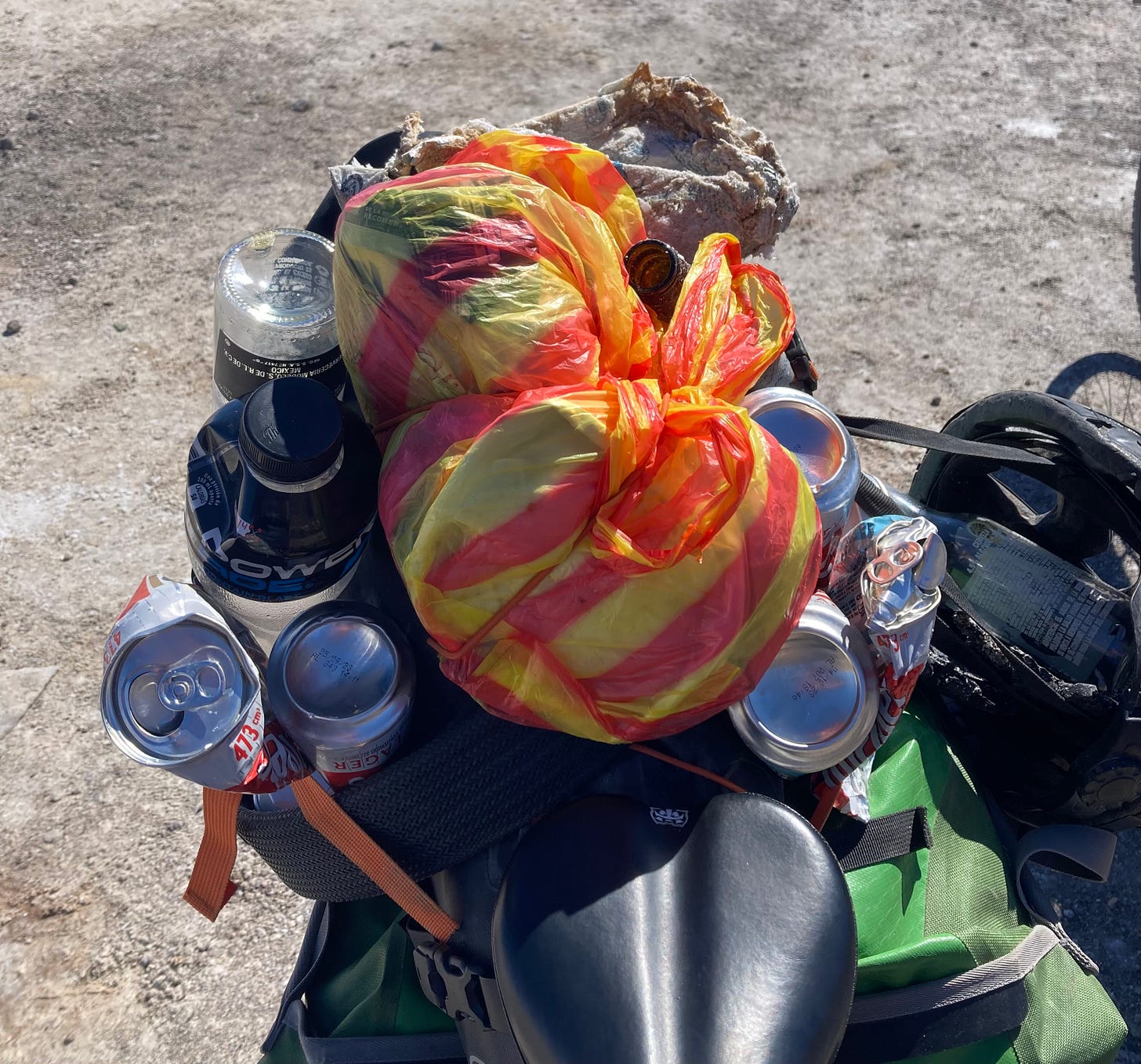
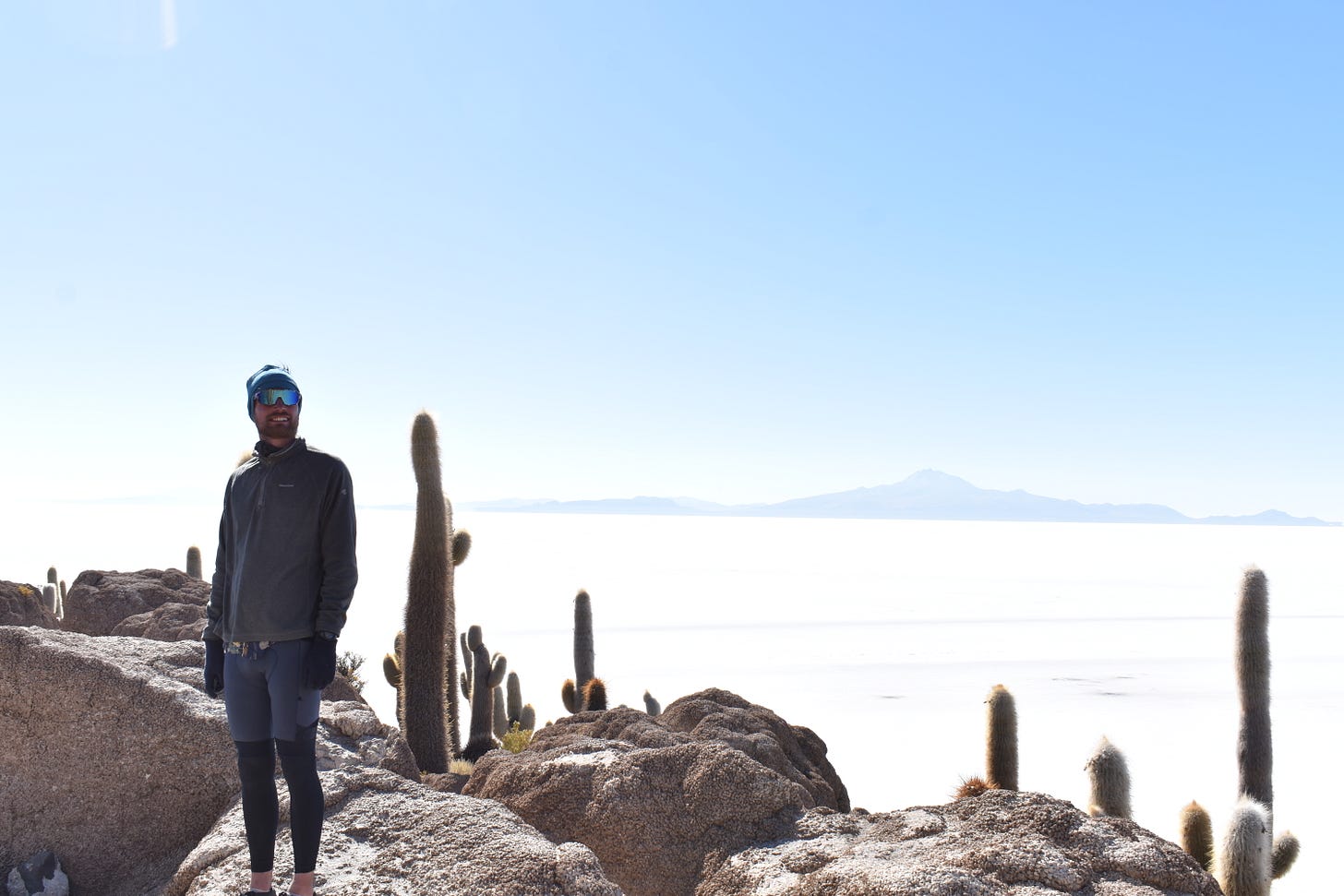

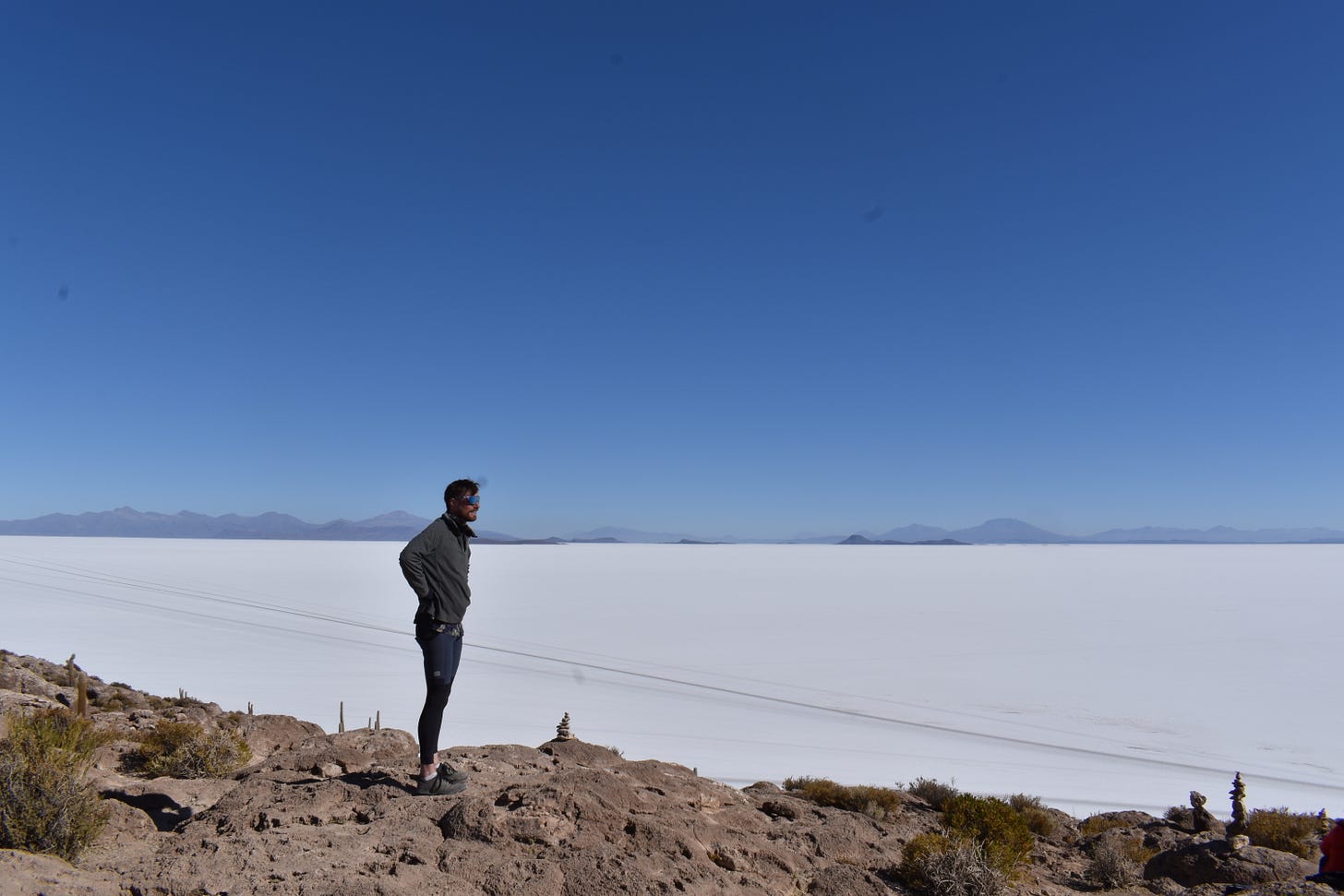
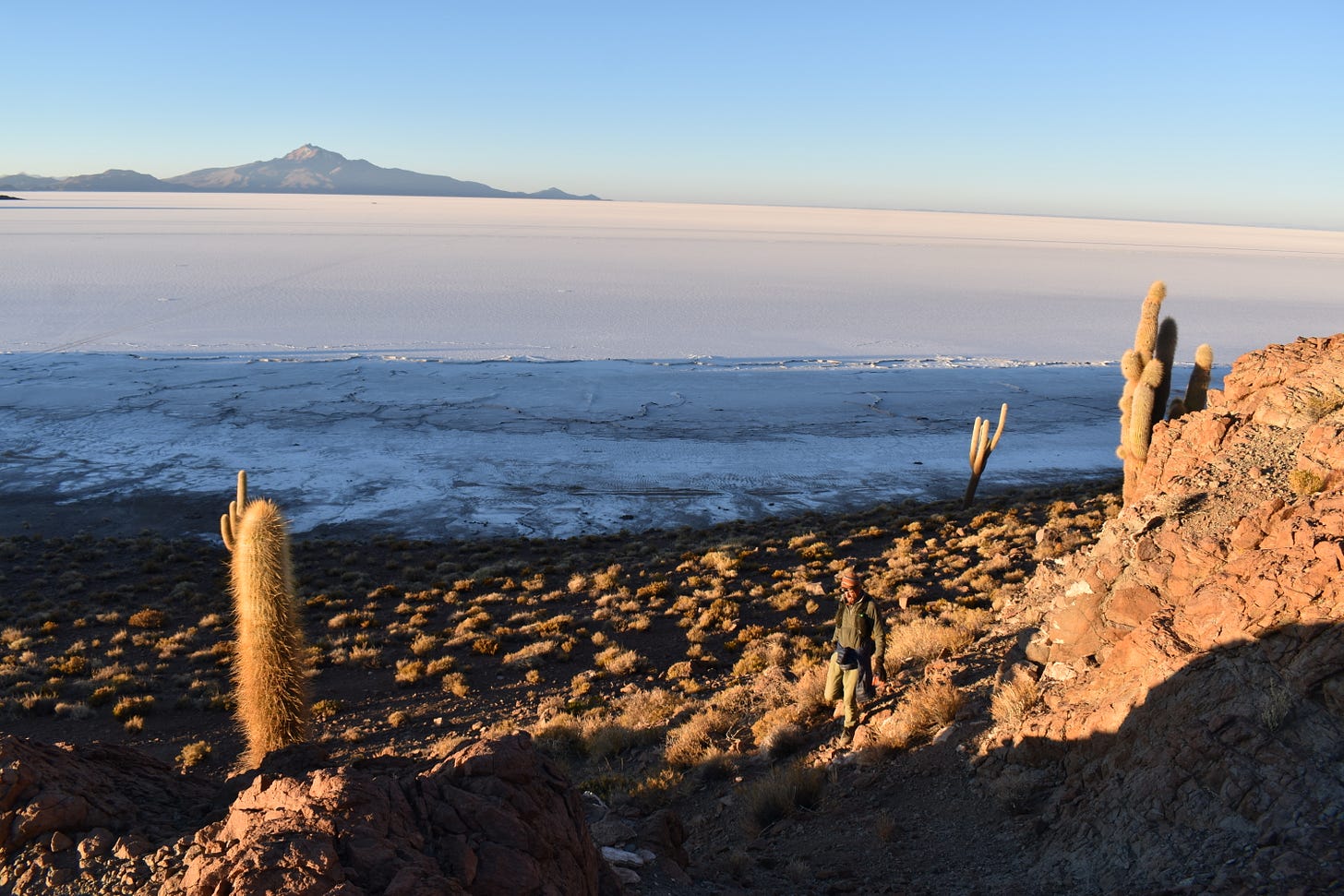
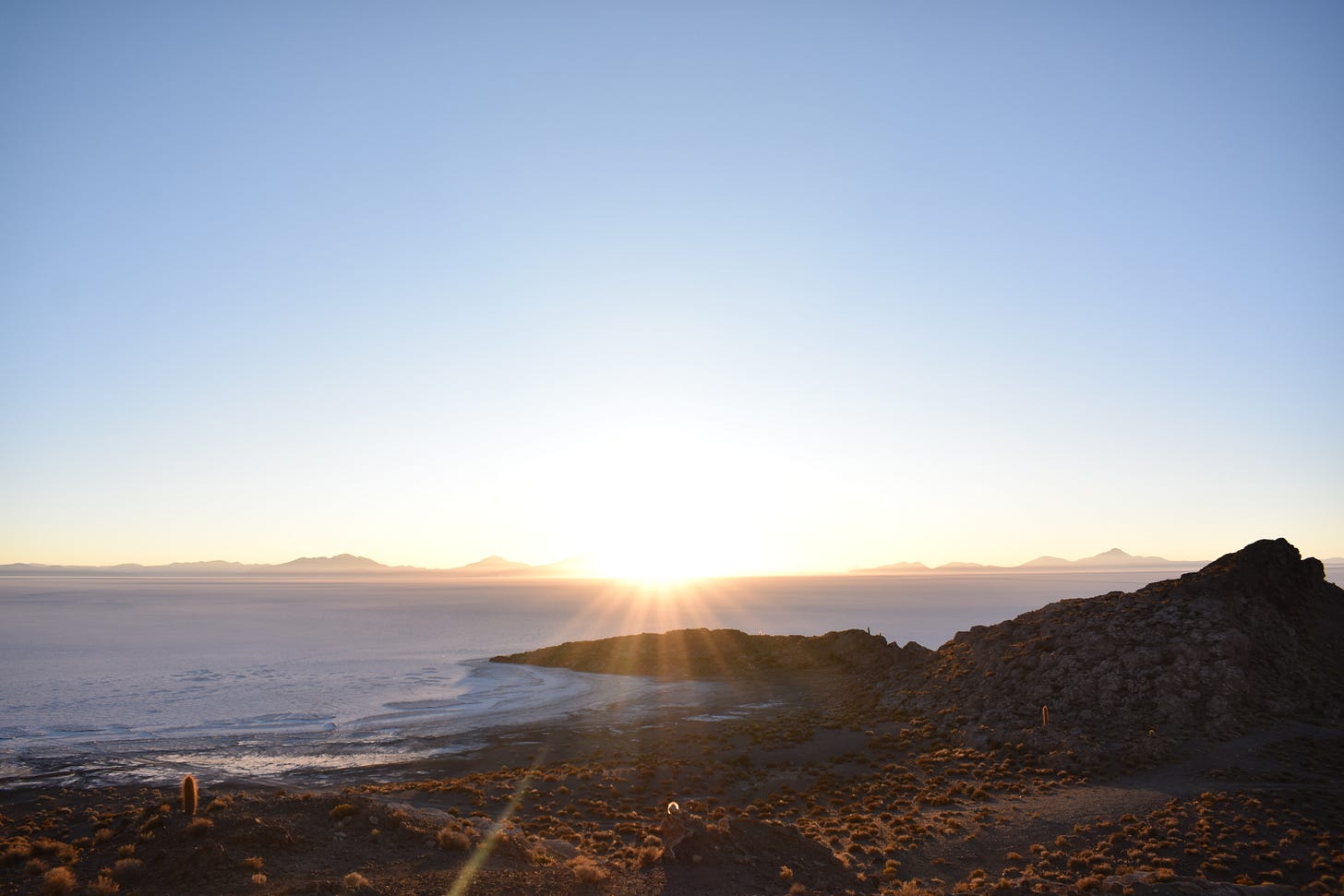


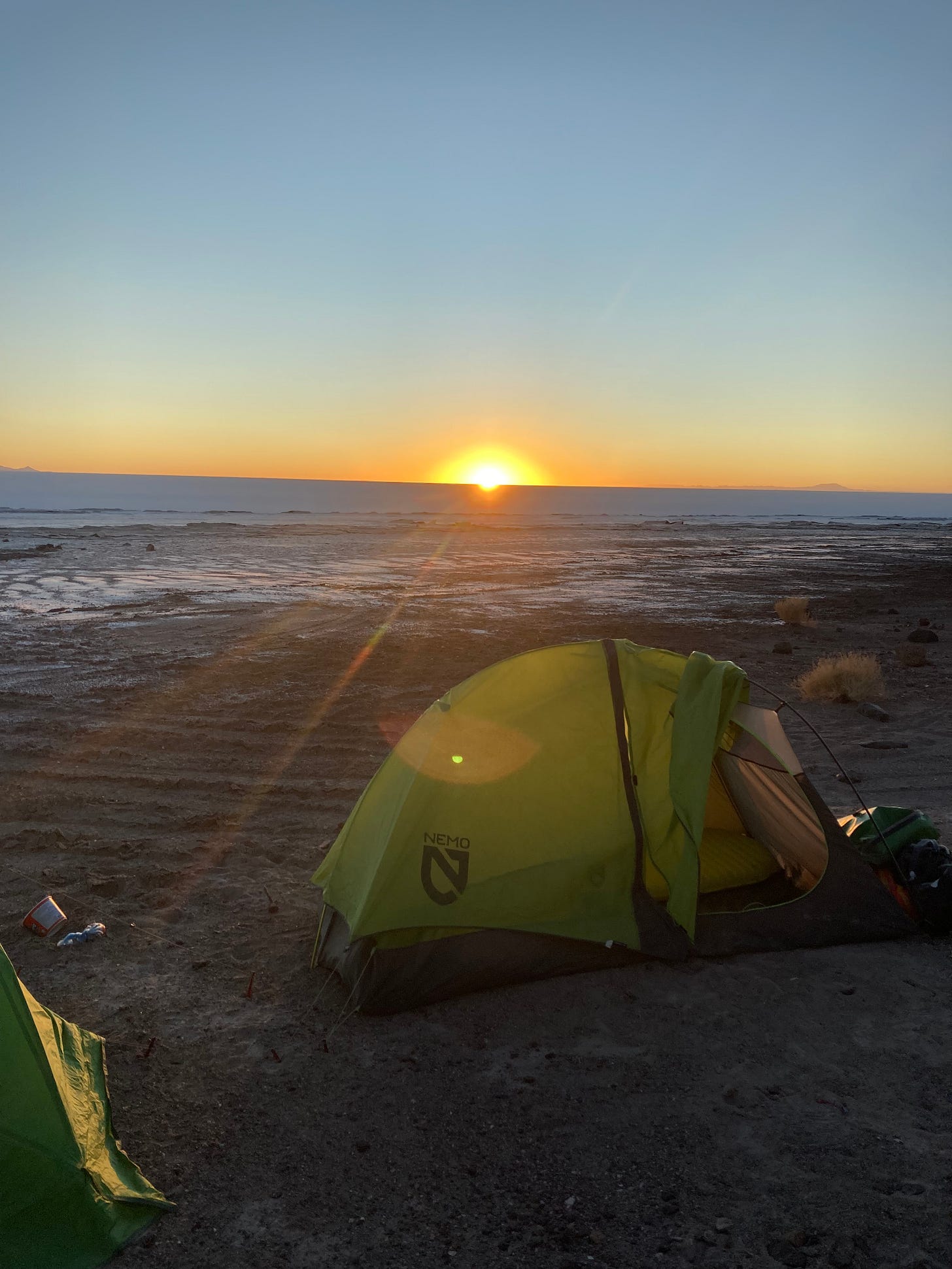
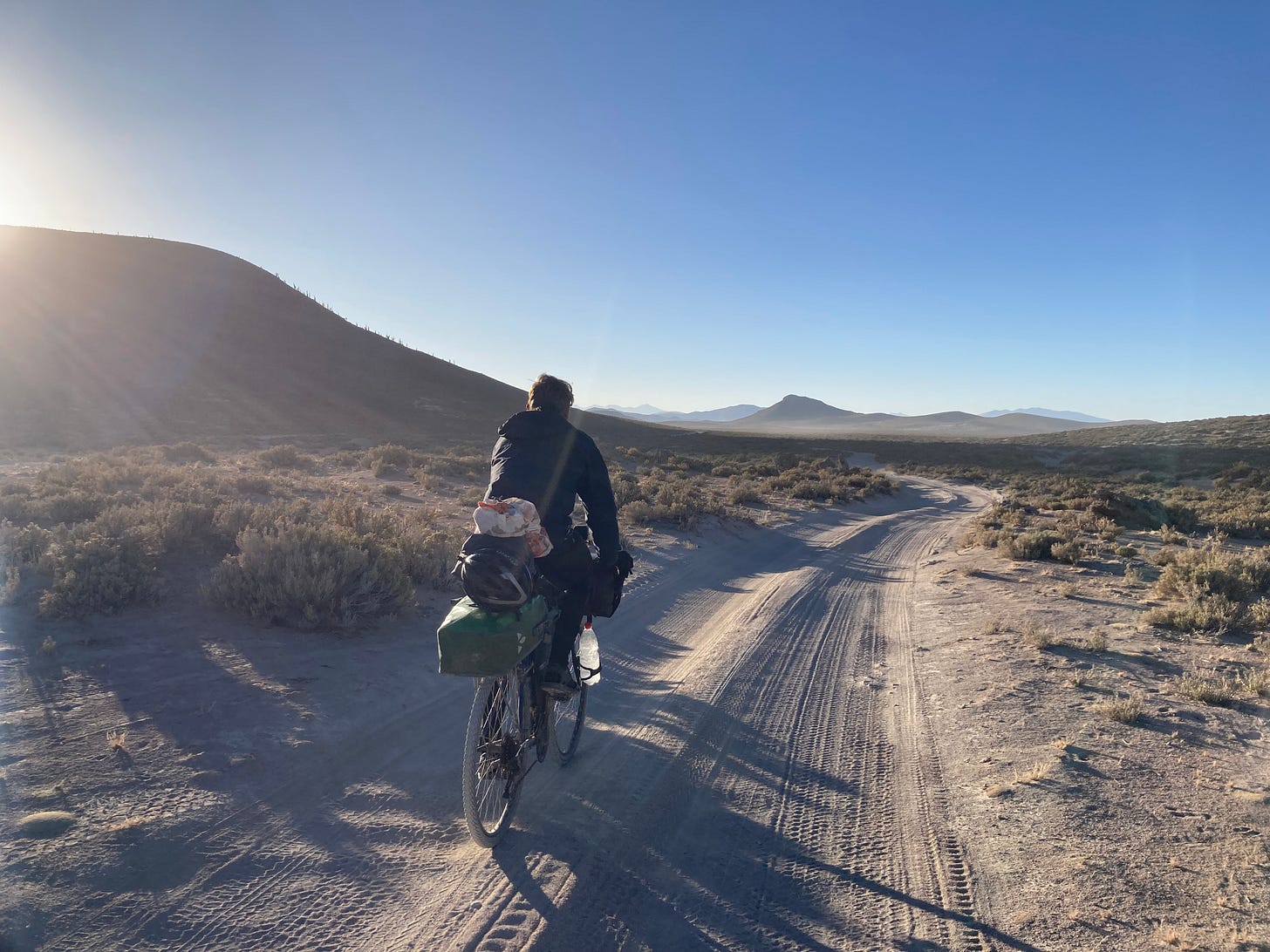
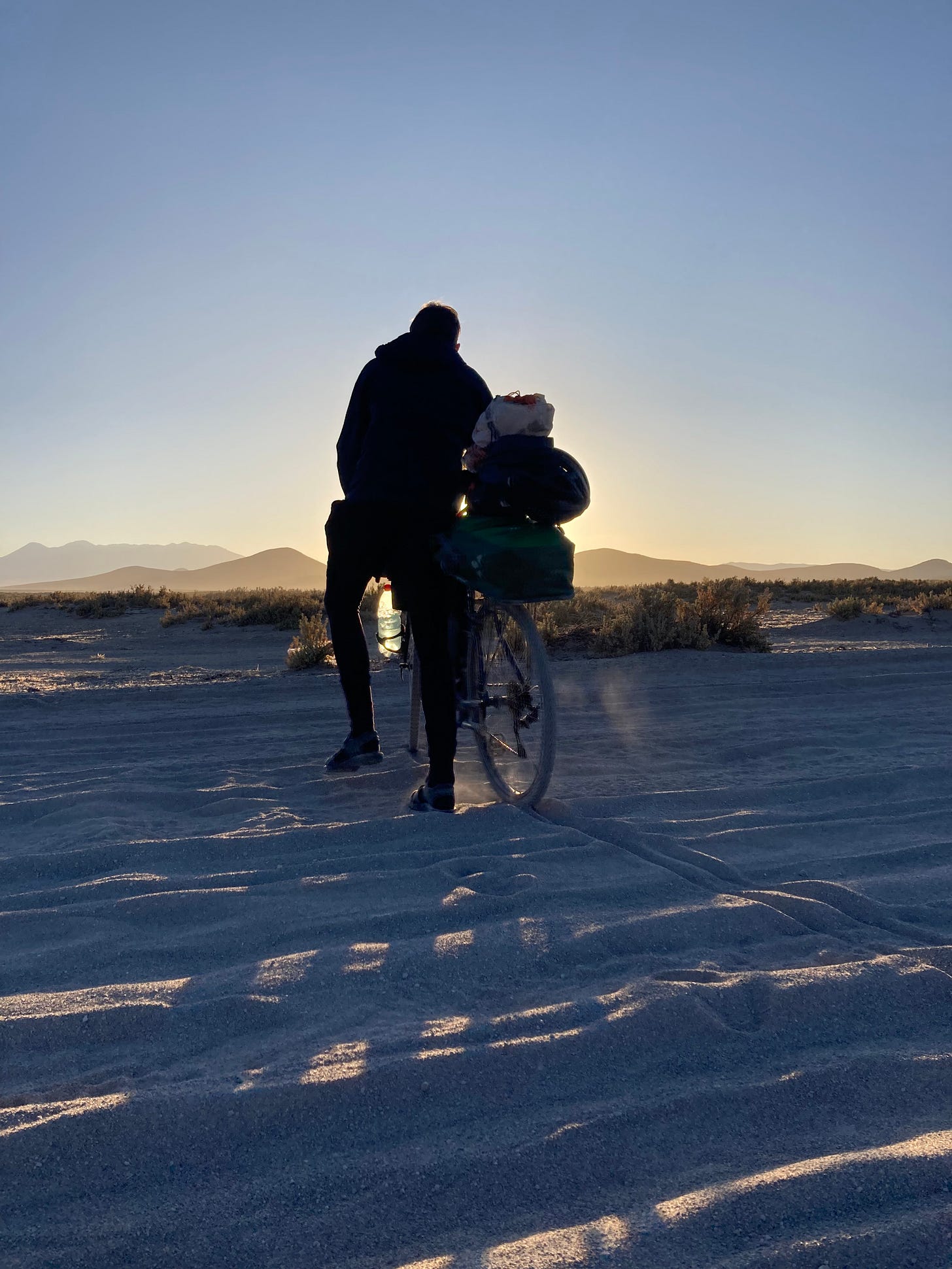


How amazing. Just can’t believe how you have settled back into life here. Reading your writings must take you relive all your experiences. Well done. Lots of love Gaga. So glad I am still able to read it all and. Be with in your adventures.xxx
Nice writing skills… it’s very exciting that you can share parts of your journey… thank you for sharing 🙏🏽